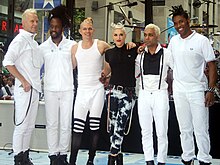Evita (soundtrack)
Directed by Alan Parker, the film was based on Tim Rice and Andrew Lloyd Webber's 1978 musical Evita about First Lady of Argentina Eva Perón, portrayed by Madonna.Rice and Lloyd Webber had employed the classical technique while creating the music, taking the central theme, "Don't Cry for Me Argentina", and tweaking it to cater to a variety of settings.Evita was promoted by the release of three singles—"You Must Love Me", "Don't Cry for Me Argentina" and "Another Suitcase in Another Hall"; the first won the Golden Globe and the Academy Award for Best Original Song in 1997.Critical reception towards the soundtrack was mixed, with AllMusic's Stephen Thomas Erlewine calling it "unengaging"[2] while Hartford Courant's Greg Morago praised Madonna's singing abilities.It topped the charts in Austria, Belgium, Czech Republic, Greece, Ireland, Scotland, Switzerland and the United Kingdom, and has sold over seven million copies worldwide.[10] Recording sessions began in September 1995, and took place at the CTS Studios in London, with Madonna and co-actors Antonio Banderas and Jonathan Pryce.[11] For the first day's sessions, music supervisor David Caddick suggested to record "Don't Cry for Me Argentina" with the 84 piece orchestra backing Madonna's vocals.[7] According to producer Nigel Wright, the lead actors would first sing the numbers backed by a band and orchestra, "then they would go off with Alan and David in a more intimate recording environment and perfect their vocals".[13] An emergency meeting was held between Parker, Lloyd Webber and Madonna where it was decided that the singer would record her part at Whitfield Street, a contemporary studio, while the orchestration would take place somewhere else.Rice and Lloyd Webber employed the classical technique while creating the music, where a composer takes a central theme and adapts it to a variety of settings, keys and tempos.[17] The central backbone and theme of the soundtrack is "Don't Cry for Me Argentina", and through the songs it tells the story of Eva's beginnings, her rise to fame, political career and gradually her death.[18] The soundtrack begins with the tracks "A Cinema in Buenos Aires, 26 July 1952" and "Requiem for Evita", both conducted by John Mauceri, dealing with the announcement of Eva's death.The sound of train horns, Latin percussion, drums, and light guitars introduce "Buenos Aires", talking about Eva finally arriving in the city.The melody finds Madonna singing in a higher range, and the song has a heavy composition in the middle with guitar, trumpets and discordant music.[19] The gentle ballad, "I'd Be Surprisingly Good for You", is about Eva meeting her husband Juan Perón; its composed of flutes, classical guitar and subdued strings.[20] Military drum beats and a brass section start off "Peron's Latest Flame", where Banderas sings loudly about the general population disapproving of Eva.[7] An Evita EP, containing remixed versions of "Buenos Aires", "Don't Cry for Me Argentina" and "Another Suitcase in Another Hall", was supposed to be released but was cancelled.[36] A separate version called the "Miami Mix", which included re-recorded vocals in English and Spanish and an Argentinean bandoneon in the song's intro, was promoted to radio.He noted that although she lacked musical theater experience, Madonna "displays a broad vocal range and, though it may be hard for those who remember 'Like a Virgin' to believe, an operatic sensibility.[53] Jim Farber from Entertainment Weekly praised Madonna's performance on the album, writing: "Aided by impeccable orchestrations (and some coaching), her vocals are years ahead of anything she'd sung before.[56] In her review of the film, Janet Maslin from The New York Times complimented Madonna's ability to emote the songs, calling them "legitimately stellar and full of fire".Although he commended Madonna's singing as a "startlingly accomplished and nuanced performance", Erlewine felt that she was "trying really hard to be credible, which makes it difficult to connect with her".[2] While reviewing the film, the San Francisco Chronicle's Octavio Roca said that the "delicious irony of Rice's lyrics remains intact, as does the freshness of Lloyd Webber's music".But Roca believed that the Latin influences present in the original songs were missing, due to John Mauceri's "languid conducting of the soundtrack, and most of all by Vincent Paterson's choreography".[61] Considine was also disappointed with the vocal abilities of Madonna and co-star Antonio Banderas; "they lack the power and tone to lend this intoned dialog a patina of musicality".[84] All lyrics are written by Tim Rice; all music is composed by Andrew Lloyd WebberCredits and personnel adapted from the 2-CD edition of the soundtrack's liner notes.


Soundtrack albumMadonnaWarner Bros.ProducerAlan ParkerAndrew Lloyd WebberNigel WrightSomething to RememberRay of LightSinglesYou Must Love Memusical film of the same nameWarner Bros. RecordsTim RiceFirst Lady of ArgentinaEva Perón1976 concept albumAntonio BanderasJonathan PryceJimmy NailDon't Cry for Me ArgentinaGolden GlobeAcademy Award for Best Original SongAllMusicStephen Thomas ErlewineHartford CourantBillboard 200Recording Industry Association of AmericaSpiritual Leader of the Nation of ArgentinaregisterCricketLondonEngineermixingSolid State Logicseries consolesConductorJohn MauceriMadonna albumStephen SondheimDick TracyOh What a CircusAnother Suitcase in Another HallJuan Perónstereotom-tom drumelectric guitarpizzicatostringsElton Johnfades outanti-climaxTower RecordsLarry FlickremixedSticky & Sweet TourAcademy AwardbandoneonBillboard Hot 100Pablo FloresThe Austin ChronicleThe Buffalo NewsEncyclopedia of Popular MusicEntertainment WeeklyThe GuardianLos Angeles TimesMusic WeekRolling StoneRolling Stone Pressmusic criticsLike a VirginJ. Randy TaraborrelliGreg KotChicago TribuneMaterial GirlPatti LuPoneAnnie ZaleskiJanet MaslinThe New York TimesThe Herald JournalSan Francisco ChronicleThe Baltimore SunJ. D. ConsidinerecitativoNo DoubtTragic KingdomGolden Globe Award for Best Motion Picture – Musical or ComedyNielsen SoundScanARIA ChartsAustralian Recording Industry AssociationRecorded Music New ZealandUK Albums ChartBritish Phonographic IndustryOfficial Charts CompanyEuropean Top 100 AlbumsAndrea CorrGary BrookerPeter PolycarpouAngeline BallAlex SharpeMichael DixonDavid CullenLawrence DermerMark "Spike" StentDave CollinsÖ3 AustriaUltratopTracklistenAlbum Top 100Suomen virallinen listaOffizielle Top 100IFPI GreeceMAHASZOriconVG-listaScottish AlbumsPROMUSICAESverigetopplistanSchweizer HitparadeUK AlbumsBillboardSoundScanHitlistenCertified unitsPro-Música BrasilList of European number-one hits of 1997